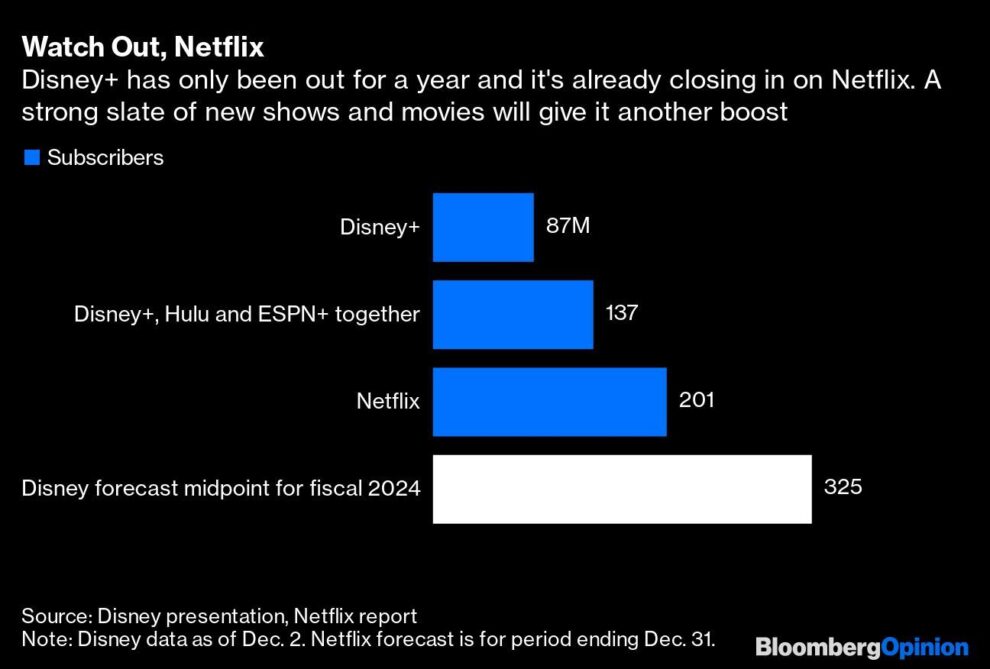
(Bloomberg Opinion) — Walt Disney Co. let the world know Thursday that it understands fans — and even shareholders — want it to dramatically step up its streaming game and add more grown-up programs to its kid-safe library. The company already has drawn almost 87 million subscribers to its namesake app, but Disney+ and other new streaming-video services still face the test of whether their offerings are complete enough for Netflix devotees to make the switch. For the first time, the answer for many may soon be “yes.” And Star, an as yet little-known Indian TV brand, is set to play a pivotal role in reaching Disney’s new awe-inspiring projection of at least 300 million total streaming subscribers globally within three years.
In a virtual investor presentation on Thursday, Star was front and center alongside Disney+, a clear signal that the company is looking to take on Netflix Inc. and AT&T Inc.’s HBO Max more directly and around the globe. Disney inherited Star from its $85 billion acquisition of 21st Century Fox in 2019, though the asset was overshadowed at the time by other properties more familiar to U.S. investors, such as Fox’s “X-Men” franchise and “The Simpsons.” Now, Star is the star of Disney’s international streaming efforts outside the U.S., with the company launching a general-entertainment service under that name next year that will feature more adult programming, filling in obvious holes left by Disney+. Rather symbolically, Hulu, another Disney unit that caters to adults in the U.S., was bumped to the side of the screen in front of which CEO Bob Chapek and other executives took turns standing to unveil the plans:
The array of product offerings is a bit messy, as is par for the course in streaming land. There’s Disney+ Star, Disney+ Hotstar and Star+. But it’s not nearly as confusing for consumers as it is for journalists and investors because you really only need to know one of those depending on where in the world you live. For example, Disney+ Hotstar exists in India and is coming to other parts of South Asia. (It also accounts for 30% of Disney+ subscribers.) For Canadians and Europeans, the Disney+ app will have a Star section with ages-18-and-up content behind a password-protected parental paywall (as I suggested it should do last month). In Latin America, Star+ will be a standalone app that can be bundled with Disney+. Star broadly will draw on programming from other parts of the Disney empire, such as ABC, FX and 20th Century Studios, in addition to having its own original works tailored to local markets.
Interestingly, that strategy stops at U.S. borders. There, Disney is sticking with its $13-a-month Disney+, Hulu and ESPN+ bundle to attract a broader subscriber base, for now. The company emphasized the lucrative advertising opportunity Hulu possesses. Hulu+ Live TV — which, like YouTube TV, upped its monthly fee to a steep $65 — naturally has only about 4 million subscribers. But Hulu overall has 92 million ad-supported viewers, said Hulu Chief Kelly Campbell. Advertising is “our superpower,” she said, adding that ads alone generate $10 a month per subscriber — implying roughly $11 billion a year. (But remember, Comcast Corp. owns 33% of Hulu.) It’s my guess that entertainment giants are all eyeing ad dollars in their streaming missions, even if they aren’t saying so yet.
It turns out, emulating Netflix is expensive, and direct-to-consumer content expenses may reach between $14 billion to $16 billion by fiscal 2024. That will fuel 100 new titles a year on Disney+, with 80% bypassing movie theaters. While it puts Netflix on notice, it’s not like Netflix is standing still — the company is constantly investing in its service as well. And despite the eye-watering costs, this is what investors largely want to see from Disney, especially with all the uncertainty around how quickly its theme parks and cruise businesses will be able to bounce back once Covid-19 vaccines are distributed. The company projects Disney+ losses will max out during the current fiscal year, before turning profitable in fiscal 2024. For Hulu and ESPN+, profitability will come a year earlier.
As part of Disney’s investment plans, there are 10 Marvel and 10 Star Wars series coming to the service. That will hurt theaters just as much — if not more — than Warner Bros.’s move to put all its movies on HBO Max next year. Disney isn’t following suit with its films just yet, with Chapek pointing to the billions of dollars it normally reaps at the box office. Still, he said the company’s recent reorganization is intended to make it more nimble to adjust where needed down the road. One way to interpret that is while Disney is going all-in on streaming, it’s not lighting a match to profits where it doesn’t necessarily have to. It’s also taking its time with price hikes, raising the Disney+ subscription in the U.S. to $8 a month, a $1 increase; European subscribers will see their plan price rise by 2 euros. However, I suspect more increases are part of the company’s internal calculus.
With some $90 billion (including debt) spent on the acquisitions of Marvel, Lucasfilm and 21st Century Fox in the last decade, Disney is getting its money’s worth. The notion that 300 million people may be willing to pay for constant access to Disney brands alone is a spectacular legacy left by former CEO Bob Iger, the architect of the modern Disney who stepped down in February. Chapek, his successor, took over during a wildly difficult period, but what Thursday showed is that Iger put in place everything he needs to adapt Disney for the new, post-pandemic world.
This column does not necessarily reflect the opinion of the editorial board or Bloomberg LP and its owners.
Tara Lachapelle is a Bloomberg Opinion columnist covering the business of entertainment and telecommunications, as well as broader deals. She previously wrote an M&A column for Bloomberg News.
For more articles like this, please visit us at bloomberg.com/opinion
Subscribe now to stay ahead with the most trusted business news source.
©2020 Bloomberg L.P.









